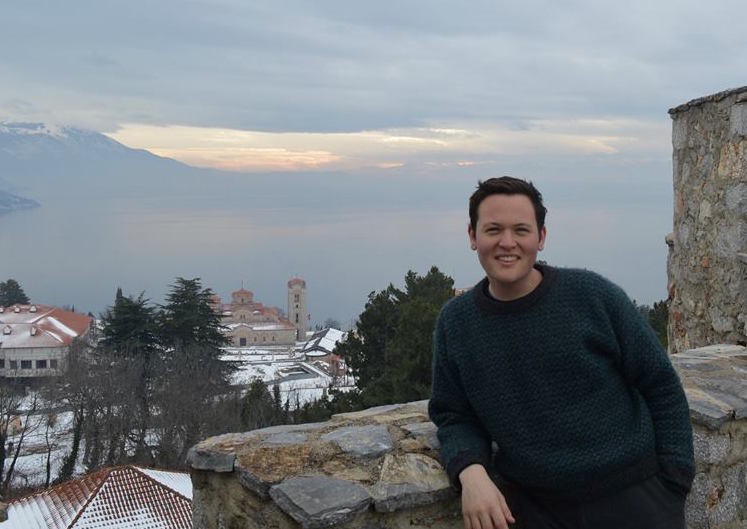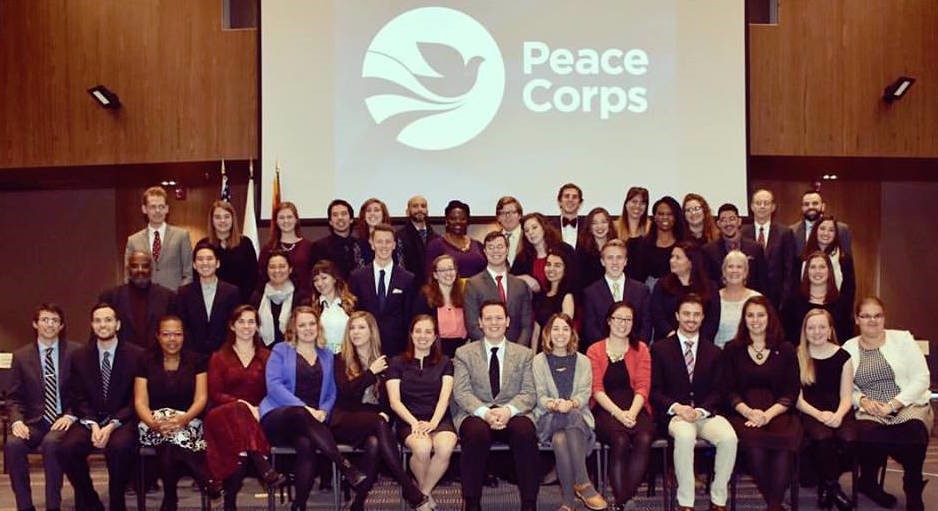Teaching and Learning in Macedonia
Austin Glock Goodwin Andrews
BA 2016, Classical Archaeology and Religious Studies

From kissing saints to making wine to participating in ritual sacrifice, my experience after graduating from UNC’s Department of Classics this past year has been anything but boring. Since last fall, I moved to Macedonia in the southern Balkans to teach English with the Peace Corps. Here, I live in a village of a couple hundred people as I navigate my way around a new language, a new culture, and an overall new lifestyle.
Every week, I teach in three small villages in the Macedonian equivalent of a county school system. Working in these schools–the smallest of which has a total of thirteen students–each day comes with its own unique set of joys and challenges. Back in Murphey Hall, lounging at Classics Tea or discussing in a seminar, I came to value the beautiful community and support system which serves as a foundation for the ideal learning environment. In my own classrooms, I strive to build such community with and among my students as we learn and grow together. My advice to the undergrads in the department now is to embrace your Classics comrades while you can!
An additional aspect of my life here that intermingles both challenge and joy has been learning Macedonian. What I’ve loved most about learning Macedonian, a South Slavic language, is that I have the ability to communicate, something that I never had with Latin or Greek. As any of my ancient language instructors could tell you, I was always less than adequate. My Macedonian proficiency thus far, solidly mediocre. That said, with what I’ve learned up until this point, I’ve been able to build relationships with my colleagues at school, sit for coffee with the grandma who sells honey on a nearby mountain, and play along with the all too regular toasts to my future marriage.
Archaeology and heritage factored in my choosing to come to work in Macedonia. The ease which with I can go and spend an afternoon exploring archaeological sites is something I could only have dreamed about previously. I’ve spent time at the Roman urban center of Stobi and the Byzantine fortress at Bargala, visited Medieval churches in Ohrid and hikes to several of the high ruins that characteristically crown many of the towns across the country. Equally commonplace are the conversations I’ve had related to constructions of ethnic, cultural, and national identity and how the ancient past fits into contemporary political, religious, and social realities. Now more than ever, I see how crucial it is to analyze and evaluate our own sets of assumptions and worldviews to better understand ourselves and our communities in context of the past, present, and future.
Living in a country where one might mistake an oar for a winnowing fan, I’ve gotten to be familiar with an agrarian way of life in a way I never anticipated. Back in October, I helped to produce many gallons of homemade wine and rakija–a traditional local brandy–by churning fermenting grapes daily. I once assisted a neighbor to clear a field and to shovel manure, after which I was compensated in kind with a delicious meal and homemade cheese (a decidedly much more pleasant cow product). Hard work and warm hospitality are two staples of Macedonian culture that remind me of integral parts of my own Southern heritage.

Learning about the culture and traditions of my community in Macedonia has also come with a host of other hands-on experiences I never expected. I’ve been taught the basic steps of oro–the local folk dance–and about how Orthodox tradition calls for osculatory regards for saint icons in churches. As reckoned by the Orthodox liturgical year, based on the Julian calendar, April 23 marked St. George’s Day. One tradition I learned about was how some folks will annually make a dedication of a sacrificial lamb for St. George’s Day for health and good fortune. Even though I’m a vegetarian, the grandpa I live with had us up at dawn for the task of slaughter and preparation of the meat. I’m very interested in ancient sacrifice and this present-day kind of example encouraged me to research more about the implications of contemporary rites as related to their antique antecedents.
I’ve enjoyed my time here in Macedonia as I proceed to get more accustomed to everything, little by little. Both with my understanding of the language and the culture, some days I feel practically fluent and others like I know nothing at all. I’ll continue to visit places across the country and continue to soak up the rich cultures present in this region as well as from the distant past. If I’ve learned anything during my time here, it’s that the past is rarely so distant as we sometimes think.